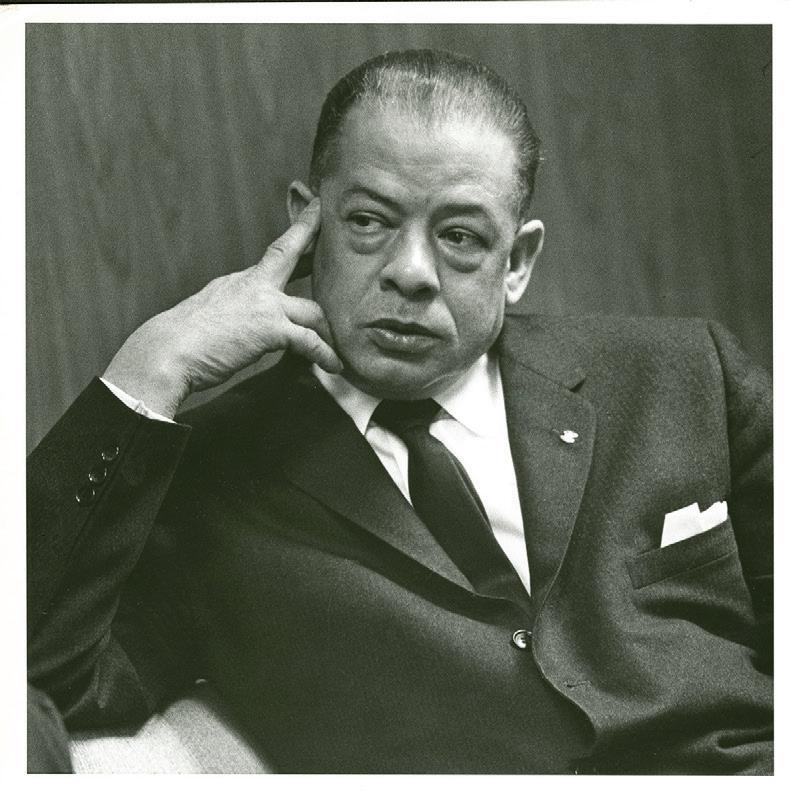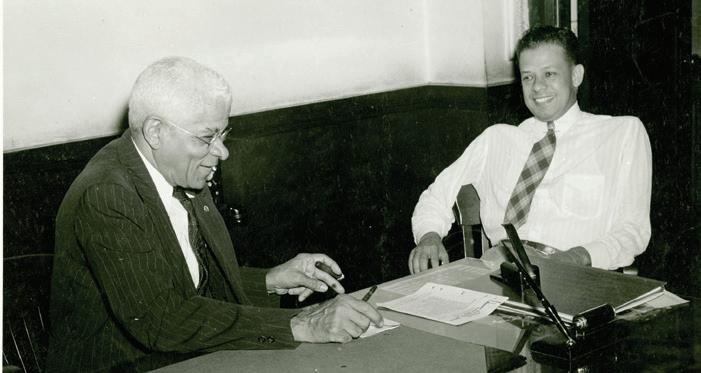
5 minute read
John Hervey Wheeler United States Courthouse Naming Ceremony
John Hervey Wheeler
John Hervey Wheeler (January 1, 1908- July 6, 1978) became a prominent bank president, civil rights lawyer, political activist, civic leader, educator, statesman, and philanthropist. He was born in Kittrell, North Carolina to John Leonidas and Margaret Hervey Wheeler. The Wheeler family, which included older sister Ruth Hervey (b. 1906) and younger sister Margery Janice (b. 1912), came from Nicholasville in Jessamine County, Kentucky. John Leonidas came to work for N.C. Mutual in July 1908. In 1912, the Wheelers moved to Georgia where the children came of age in Jim Crow Atlanta. After graduating summa cum laude from Morehouse College in 1929, John Hervey moved to Durham where he joined the Mechanics and Farmers Bank (M&F Bank) as a teller. On Christmas Day in 1935, he married Selena Lucille Warren (1912-2014), daughter of Julia McCauley and Dr. Stanford L. Warren, a co-founder and one-time president of M&F Bank. They had two children from their union, Julia Margaret (b. 1937) and Warren Hervey (b. 1943).
Advertisement

By the 1960s. Wheeler was the state’s most influential black power broker and among the top civil rights leaders in the South. He remained with M&F Bank his entire career, rising from bank teller to the presidency where he served from August 1952 to July 1978. As M&F Bank president, Wheeler carried the banner as a community bank while also expanding its reach. During World War II, he enrolled in law school at North Carolina Central University where, in 1947, he was among the first law school graduates. He became a political activist with the Durham Committee on the Affairs of Black People (DCABP) and had stints as chairman of the economic and education committees before taking over as the organization’s chairman in 1957, a position he held until 1978.
Through the DCABP’s education committee, Wheeler led a legal challenge beginning in 1949 toward school equalization in Durham and other cities across North Carolina. In 1951, a judge ruled in the case Blue v. Durham that “plaintiffs have been, and are, discriminated against on account of their race and that they are entitled to injunctive relief.” After the U.S. Supreme Court’s landmark Brown v. Board of Education (1954) decision, Wheeler and other black leaders from across North Carolina called for immediate implementation. They ultimately filed several school desegregation suits before the decade ended, and continued to use the legal realm to fight for black educational equality. In 1956, he and several other Durham attorneys, including Floyd B. McKissick, Sr., Conrad O. Pearson, and William A. Marsh, Jr., won the U.S. Supreme Court case Frasier v. Board of
Trustees of the University of North Carolina, which led to the first three black undergraduates gaining admission to the state’s flagship institution.
In 1961, President John F. Kennedy appointed him to the President’s Committee on Equal Employment Opportunity (PCEEO). In 1963, Wheeler became an incorporator of the North Carolina Fund, an ambitious antipoverty agency established by Governor Terry Sanford to help eradicate issues of poverty. He joined the board of directors and his bank became the repository for the accounts. In 1964, Sanford names Wheeler as a delegate to the Democratic Party’s national convention, the first African American from the state to do so. That same year, Wheeler became the first black president of the Southern Regional Council (SRC), a civil rights organization founded in 1944 that administered the Voter Education Project (VEP), which helped increase voter registration in the South leading to the Voting Rights Act of 1965. In the last decade of his life, John Hervey Wheeler continued his activism whereby he received many awards and accolades for his civil rights work. He mentored a rising generation of leaders so they could “take their appointed places in American life.”
Wheeler was
a living legend
throughout the
South. He was not
just a banker and
lawyer; he was a
visionary African
American leader.
CONGRESSMAN G.K. BUTTERFIELD


Oct 15, 2019 Press Release Office of Congressman G. K. Butterfield
DURHAM, N.C.—Congressman Butterfield joined with the Durham, North Carolina community and the family of the famed banker and attorney John Hervey Wheeler to celebrate the naming of the city’s federal courthouse after the late North Carolina-native and civil rights leader. Congressman Butterfield led the official unveiling of the sign on the newly designated John Hervey Wheeler U.S. Courthouse during the special ceremony hosted by the U.S. General Services Administration (GSA) and the U.S. District Court for the Middle District of North Carolina.
1952 National Bankers Association 25th Annual Convention Memphis, TN
“On July 27, 2017, I was proud to introduce H.R. 3460, a bill to rename the U.S. Courthouse in Durham after John Hervey Wheeler. H.R. 3460 was passed in the House of Representatives on July 16, 2018, and was passed in the Senate on December 21, 2018,” said Butterfield. “John Hervey Wheeler was a living legend throughout the South. He was not just a banker and lawyer; he was a visionary African American leader. Over his long and remarkable career, John Hervey Wheeler played a key role in transforming the City of Durham and helped lead the fight for racial equality in Durham and throughout North Carolina. I am happy the Durham courthouse is now named in John Hervey Wheeler’s honor and his contribution to Durham will long be remembered. This dedication has served as a symbol of triumph over racial and economic injustice.”
The bill naming of the courthouse after Wheeler was signed into law on January 3, 2019, honoring his commitment to equality and his work during the Civil Rights Movement.
“When we name a building, we’re honoring the accomplishments of great Americans who inspire us to help make our nation a better place for all people,” said Brian Stern, regional administrator for GSA’s Southeast Sunbelt Region. “John Hervey Wheeler distinguished himself as a banker, attorney, and civil rights leader for the Durham community, the state of North Carolina and our country. It is an honor to commemorate his legacy today with the naming of this courthouse.”
When we name
a building, we’re
honoring the
accomplishments
of great
Americans who
inspire us to help
make our nation a
better place for all
people.
BRIAN STERN Regional Administrator for GSA’s Southeast Sunbelt Region







